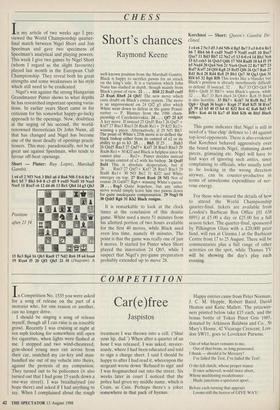CHESS
Short's chances
Raymond Keene
In my article of two weeks ago I pre- viewed the World Championship quarter- final match between Nigel Short and Jon Speelman and gave two specimens of Speelman's analytical and playing powers. This week I give two games by Nigel Short (whom I regard as the slight favourite) played last month in the European Club Championship. They reveal both his great strengths and some weaknesses in his style which still need to be eradicated.
Nigel's win against the strong Hungarian Grandmaster Pinter shows to what depths he has researched important opening varia- tions. In earlier years Short came in for criticism for his somewhat happy-go-lucky approach to the openings. Now, doubtless at the urging of his second, the world- renowned theoretician Dr John Nunn, all that has changed and Nigel has become one of the most deadly of openings practi- tioners. This may, paradoxically, not be of great use against Speelman, who tends to favour off-beat openings.
Short — Pinter: Ruy Lopez, Marshall Gambit.
1 e4 e5 2 Nf3 Nc6 3 Bb5 a6 4 Ba4 Nf6 5 0-0 Be7 6 Rel b5 7 Bb3 0-0 8 c3 d5 9 exd5 Nxd5 10 Nxe5 Nxe5 11 RxeS c6 12 d4 d6 13 Rel Qh4 14 g3 Qh3
Position after 21 f4 15 Be3 Bg4 16 Qb3 RaeS 17 Nd2 Re6 18 a4 bxa4 19 Rxa4 f5 20 Qfl Qh5 21 f4 (Diagram) A
well-known position from the Marshall Gambit. Black is happy to sacrifice pawns for an attack on the king's side. It is a variation which John Nunn has studied in depth, though mainly from Black's point of view. 21 . . . RbS 22 BxdS cxd5 23 Rxa6 RbeS 24 Qb5! The new move which casts doubt on Black's entire system. The move is an improvement on 24 Qf2 g5 after which White went down to defeat in the game Prand- stetter — P. Blatney from the 1986 cham- pionship of Czechoslovakia. 24 . . . Qf7 25 h3! A key move. If instead 25 Qxd5 Rxe3 26 Qxf7 + Kxf7 27 Rxe3 Rxe3 28 Rxd6 Rel+ 29 Kf2 Re2+ winning a piece. Alternatively, if 29 Nfl Bh3. The point of White's 25th move is to deflect the black bishop either from its control of e2 or its ability to go to h3. 25 . . . BhS. If 25 . . . Bxh3 26 Qxd5 Rxe3 27 Qxf7+ Kxf7 28 Rxe3 Rxe3 29 Rxd6 Rel + 30 Kf2 and Black is helpless since he cannot play . . . Re2+. Pinter decides instead to retain control of e2 with his bishop. 26 Qxd5 Bxf4 This is absolute desperation, but if 26 . . . Rxe3 27 Qxf7+ Kxf7 28 Rxe3 Rxe3 29 Rxd6 Rel+ 30 Nfl Be2 31 Kf2! and White emerges on top. 27 Rxe6 Rxe6 28 Nfl Not of course 28 Gxf4?? Rg6+ winning White's queen. 28 . . . Bxg3 Quite hopeless, but any other move would simply leave him two pawns down for quite inadequate compensation. 29 Nxg3 f4 30 QxhS Rg6 31 1022 Black resigns.
It is remarkable to look at the clock times at the conclusion of this drastic game. White used a mere 51 minutes from his allotted portion of two hours available for the first 40 moves, while Black used even less time, namely 48 minutes. The point is that the game was really one of just 8 moves. It started for Pinter when Short played the innovation 24 Qb5, while I suspect that Nigel's pre-game preparation probably extended up to move 28. Korchnoi — Short: Queen's Gambit De- clined.
1 c4 e6 2 Nc3 d5 3 d4 Nf6 4 Bg5 Bel 5 e3 0-0 6 Ref h6 7 Bh4 b6 8 cxd5 NxdS 9 NxdS exd5 10 Bxe7 Qxe7 11 Bd3 Bb7 12 Ne2 c5 13 0-0 c4 14 Bbl Nc6 15 b3 cxb3 16 Qxb3 Qd6 17 Nf4 Rad8 18 h4 f5 19 h5 Nxd4 20 Qa4 Ne6 21 Nxe6 Qxe6 22 Rc7 Rf7 23 Rxf7 Kxf7 24 Qf4 Kg8 25 BxfS Qf6 26 Qc7 Ba6 27 Rdl Bc4 28 Rd4 Re8 29 Bbl Qe7 30 Qg3 Qe6 31 Rf4 b5 32 Bg6 Rf8 This looks like a blunder but Black's position is already inordinately difficult to defend. If instead, 32 . . . Re7 33 013 Qc8 34 Rf8+ Qxf8 35 Bh7+ wins Black's queen, while 32 . . . Re7 33 Re4 dxe4 34 Qb8+ Re8 35 Bxe8 is also horrible. 33 Bh7+ Kxh7 34 Rxf8 Be2 35 Qg6+ Qxg6 36 hxg6+ Kxg6 37 Ra8 Kf5 38 Rxa7 g5 39 a3 h5 40 f3 h4 41 Kf2 Bc4 42 Ra8 Bd3 43 Rf8+ Ke6 44 f4 Ke7 45 Rh8 Kf6 46 Rh5 Black resigns.
This game indicates that Nigel is still in need of a 'blue chip' defence to 1 d4 against top-level opponents. There is also evidence that Korchnoi behaved aggressively over the board towards Nigel, slamming down pieces, grimacing etc. Nigel will have to find ways of ignoring such antics, since complaining to officials, who usually tend to be looking in the wrong direction anyway, can be counter-productive in terms of unwelcome expenditure of ner- vous energy.
For those who missed the details of how to attend the World Championship quarter-final, tickets are available from London's Barbican Box Office (01 638 8891) at £5.00 a day or £25.00 for a full season ticket. The quarter-final, sponsored by Pilkington Glass with a £20,000 prize fund, will run at Cinema 1 at the Barbican Centre from 17 to 25 August. There will be commentaries plus a full range of other activities on the spot, while Thames TV will be showing the day's play each evening.






















































 Previous page
Previous page